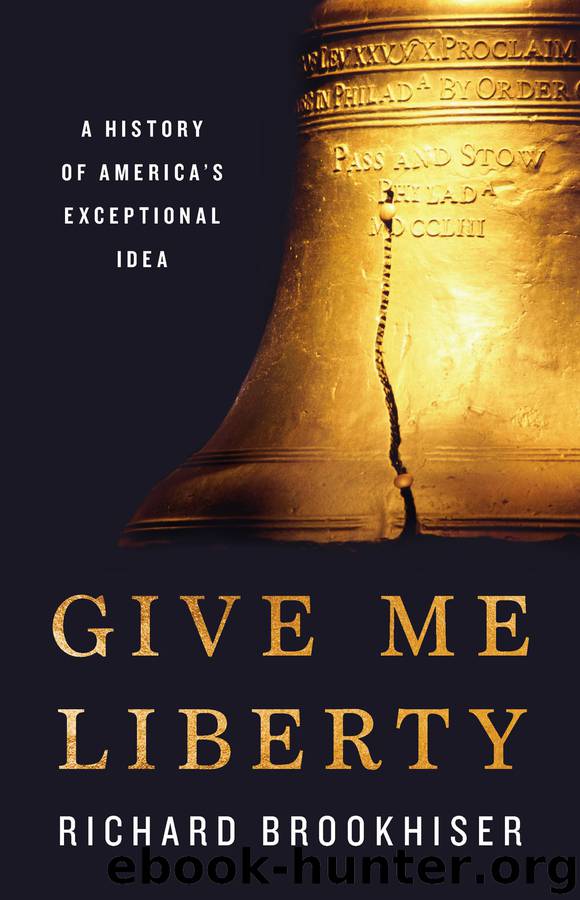Give Me Liberty: A History of America's Exceptional Idea by Richard Brookhiser

Author:Richard Brookhiser
Language: eng
Format: epub
Tags: Conservatism & Liberalism, Democracy, History, Nationalism & Patriotism, Political Ideologies, Political Science, Politics & Government, United States
Publisher: Basic Books
Published: 2019-11-05T03:00:00+00:00
chapter eight
SENECA FALLS DECLARATION
Women’s Suffrage
WARS SOMETIMES OPEN SOCIAL SPACE FOR women. When men go off to fight and die, women take their places, running households and family businesses. Lucy Knox, wife of George Washington’s commander of artillery, wrote her husband, Henry, in 1777, hoping that “you will not consider yourself as commander in chief of your own house” after the war, “but be convinced… that there is such a thing as equal command.”1
In New Jersey some Revolutionary War–era women enjoyed equal rights to vote, thanks to the state’s first postcolonial constitution, ratified on July 2, 1776, which spoke of voters as “inhabitants,” not “freemen,” the word often used in other states. The phraseology may have been inadvertent—the constitution was rushed together in the face of an impending British invasion—but New Jersey’s women took note. A property qualification limited the number who might vote, since in marriage all property belonged to the husband. But single women and widows worth more than fifty pounds ($2,500 today) were eligible, and there were enough of these to constitute a voting bloc, which acquired a nickname—the “petticoat vote.”
Soon the space for women shrank again. Besides tradition and traditional interpretations of the Bible, the weight of Anglo-American law impinged on them. William Blackstone’s Commentaries on the Laws of England, a transatlantic legal digest that had served as a textbook since its publication in the 1760s, explained the doctrine of coverture. “The very being or legal existence of the woman is suspended during the marriage, or at least is incorporated and consolidated into that of the husband: under whose wing, protection, and cover, she performs everything; and is therefore called in our law-french a feme-covert.” Blackstone added, gallantly, “that even the disabilities, which the wife lies under, are for the most part intended for her protection and benefit. So great a favorite is the female sex of the laws of England”—and of America.2
New Jersey’s women eventually lost their vote—not by law but by ordinary political skullduggery. In 1807 the state suffered an election that was corrupt even by New Jersey standards (the issue was, should the capital be in Newark or Elizabeth: real property values were at stake). In the enthusiasm of the contest, some towns reported more votes cast than they had residents. Ashamed of what its political culture had produced, the state reformed itself by purging its voting rolls of women and free blacks.3
If change were to come, it would very likely begin in western New York, which by the 1820s had become a proving ground for reforms, religions, and enthusiasms.
The American Revolution had destroyed the region’s former occupants, the Iroquois Confederacy, too many of whom had sided with the British. The land opened for settlement; the Erie Canal (finished in 1825) brought commerce, canal towns, and factories. New York, which had been the fifth largest state in 1790, had become the largest by 1810.
The rolling countryside was also a “psychic highway,” a transmission belt for visionaries, moralists, and organizers.4 America’s first homemade religion (Mormonism),
Download
This site does not store any files on its server. We only index and link to content provided by other sites. Please contact the content providers to delete copyright contents if any and email us, we'll remove relevant links or contents immediately.
| Anarchism | Communism & Socialism |
| Conservatism & Liberalism | Democracy |
| Fascism | Libertarianism |
| Nationalism | Radicalism |
| Utopian |
The Secret History by Donna Tartt(16627)
The Social Justice Warrior Handbook by Lisa De Pasquale(11489)
Thirteen Reasons Why by Jay Asher(7788)
This Is How You Lose Her by Junot Diaz(5774)
Weapons of Math Destruction by Cathy O'Neil(5038)
Zero to One by Peter Thiel(4824)
The Myth of the Strong Leader by Archie Brown(4789)
Promise Me, Dad by Joe Biden(4449)
Beartown by Fredrik Backman(4419)
Stone's Rules by Roger Stone(4416)
How Democracies Die by Steven Levitsky & Daniel Ziblatt(4399)
The Fire Next Time by James Baldwin(4343)
100 Deadly Skills by Clint Emerson(4079)
A Higher Loyalty: Truth, Lies, and Leadership by James Comey(4033)
Rise and Kill First by Ronen Bergman(4012)
The David Icke Guide to the Global Conspiracy (and how to end it) by David Icke(3883)
The Farm by Tom Rob Smith(3872)
Secrecy World by Jake Bernstein(3783)
The Doomsday Machine by Daniel Ellsberg(3731)
